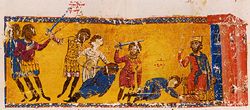Did a descendant of Bardas Sclerus bring down Maniakes?
 Listener Shane asks if Romanus Sclerus- the man who brought down George Maniakes- was related to the Bardas Sclerus who tried to seize the throne from Basil II.
Listener Shane asks if Romanus Sclerus- the man who brought down George Maniakes- was related to the Bardas Sclerus who tried to seize the throne from Basil II.
Romanus was indeed the great-grandson of the general Bardas. The Sclerus family was an old aristocratic one that claimed dynastic ties to Basil I, and was constantly trying to inch closer to the throne. The real ambitious one in the family- and arguably the most successful- was Romanus’ sister Maria. She fell in love with Constantine Monomachus, an up and coming nobleman who was on a very short list to marry the reigning empress Zoë. When Constantine was outmaneuvered and banished to the island of Lesbos, Maria followed, trusting that fate would offer them a second chance at the throne. Seven years later the political winds had changed and Zoë summoned Constantine to the capital to become her husband. At their very first meeting together, Constantine brazenly demanded that the empress should bring Maria to Constantinople- and give her suitable titles as well. Zoë, now 64 and interested only in the trappings of power, philosophically agreed. Maria was brought to the capital with great pomp and installed into the imperial palace next to Constantine. Now, if Zoë wanted to see her husband, she had to go through the awkward process of clearing it with Maria first.
It was at this point- with nary an objection from the compliant empress- that the two lovers realized they could get away with virtually anything. Why should Maria be content with the designation of ‘official mistress’? She was after all a member of an old and dignified family. Constantine drew up a document officially giving her the title ‘Augusta’, Zoë obligingly signed it, and the entire Senate was called in to ratify it. There were now three empresses (Zoë’s sister was also an empress) and a total of four heads of state. Oddly enough, Zoë doesn’t appear to have minded the bizarre arrangement. As long as she had access to the treasury Constantine could do as he liked.
The imperial ménage a trios may have been ok with the court, but it nearly got Constantine lynched. The population of Constantinople was scandalized and tried to rush the emperor as he was mounting his horse at the imperial gates. Screaming that they didn’t want Maria for empress- only a pure Macedonian- they overpowered the guards, and would have killed Constantine if not for the sudden appearance of Zoë gesticulating wildly from a balcony. From then on Constantine only appeared in public with Zoë safely at his side- and Maria following a distance behind. He probably still intended to somehow make her the senior empress, and given enough time perhaps he could have, but she died suddenly in 1045. A decade later Constantine expired as well, and in a final posthumous slap at Zoë, chose to have himself interred next to his beloved Maria. The old rebel Bardas Sclerus would have been pleased.